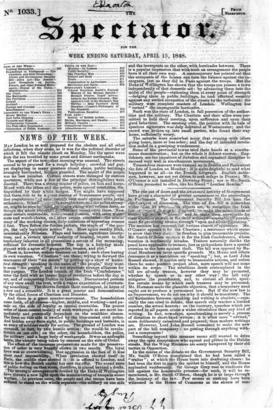NEWS OF THE WEEK.
MAY London be as well prepared for the cholera and all other inflictions, when they come, as it was for the political disorder of which it felt the remote shock on Monday, like the spent wave from the sea troubled by some great and distant earthquake.
The aspect of the tows-iAhat morning was unusual. The streets seemed to be prepared for a rough holyday ; crowded and gay, yet displaying in many quarters closed shops, public buildings strangely barricaded, bridges guarded. The aspect of the people was no less peculiar. Certain streets were thronged by curious spectators, while not a few of the principal thoroughfares were deserted. There was a strong muster of police, on foot and horse. Mixed with the idlers and the police, were special constables, dis- tinguished by their *bite badges. You might have supposed that there was to be a great display of Temperance people, and that preparations cons. -iuently been made against ultra jovial
enthusiasm. Where sty, were hickest, area the police strong-
est, might be seen 101.. r ill Whikillg With solemn faces as
though the whole iMpoR rested:opon them. Now
come certain respectable, well-1.,-essed r-:asons with satin 1ists coats and watch-chains, anl other ornate attr:ibutes—the angle- - cracy of the working classes, duly conscious of appearing comme it faut. Then follow the fustian jackets, the staple of " the peo- ple, the only legitiMate source" &c. Here again sundry Irish, unmistakably Milesian. Flags and banners, significant inscrip- tions, and a certain uneasy audacity of bearing, impart to the tomfoolery inherent in all processions a savour of the menacing, sufficient for dramatic interest. The day is a holyday made piquant with a spice of " gunpowder, treason, and plot." There is, however, serious business on hand; each class having its own vocation. " Chartists" are there, trying to forward the enactment of their " six points" by getting up a show of nume- rical strength: speaking in the name of " the people," they want to seem " the people," and do not repudiate strange alliances for that purpose. The London branch of the Irish "Confederates" enter the field with an insane hope of revolution before the day is out, and of conquering Dublin in London. Discontented persons of any view swell the rout, with a vague expectation of overturn- ing something. The thieves furnish their contingent, in hopes of a row and a scramble. It is a great muster and demonstration by the allied forces of Chartism and Disorder.
And there is a great counter-movement. The householders come forth, of all classes—higher, middle, and working—and pa- rade on the side of loyalty as special constables. The poorer order of these consist mainly of such workpeople as are most im- mediately and personally dependent on the wealthier classes. The force on this side is swelled by the blue-coated civil police. And hidden away from sight, in public buildings and barracks, is an army of soldiers ready for action. The ground of London was occupied, in fact, by two hostile armies: the would-be revolu- tionists on one side ; on the other, the householders, the police, the military, and a large body of workpeople. It was an unfought battle, the victory being taken by consent on the side of Order. The effect of the immense preparations made for the preserva- tion of order is very happily shown in two results. The loyal force was so overwhelming, that aggression in the face of it was sheer mad impossibility. When revolution showed itself in Paris, the middle class abetted it : it is offered to London, and this is how the British capital has met the offer. The sound state of public feeling on that score, therefore, is placed beyond a doubt.
The strategic arrangements devised by the Duke of Wellington have thrown a new light upon the manceuvering of troops in street warfare. In previous cases, the people and the troops have been suffered to stand on the whole separate—the soldiery on one side
and the insurgents on the other, with barricades between. There is a popular impression that with such an arrangement the people have it all their own way. A contemporary has pointed out that the occupants of the houses can turn the balance against the in- surgents, just as they did in Paris against the troops. But the Duke of Wellington has shown that the troops can possess a town independently of that domestic aid : by advancing them into the midst of the people—stationing them at every point of strength —lodging them in public buildings, he took effectual security against any settled occupation of the streets by the turbulent : the military were complete masters of London. Wellington has " turned" the impregnable barricades.
Such was the state of London, in full possession of the author- ities and the military. The Chartists and their allies were per- mitted to hold their meeting, upon sufferance and upon their good behaviour. The meeting over, the petition with its bale of spurious signatures was duly delivered at Westminster-' and the crowd was broken up into small parties, who found their way home, sufficiently weary.
The suburbs were somewhat noisy, that evening with idlers going home, more or less sober; and the day of intended revolu- tion ended in a gossiping wonderment.
Some of the provincial towns tried their hands at a simulta- neous demonstration ; but on the whole it dictnot answer. Eng- lishmen are too impatient of dictation and organized discipline to succeed very well in simultaneous movements.
Tremendous rumours were vamped up in Dublin and Paris about the fate of London on Monday : it is quite frightful to read what happened to us all—in the French telegraph. English noble- men, however, are not yet driven to seek refuge in France ; Mr. O'Connor is not installed in Downing Street; nor is Mr. Smith O'Brien promoted to office, like his friend "Leather Rowlin."


























